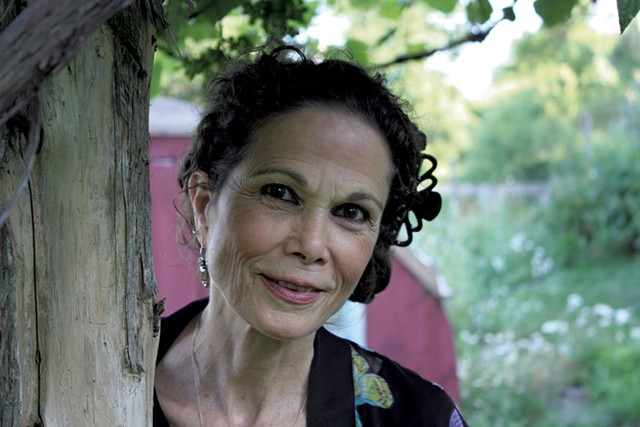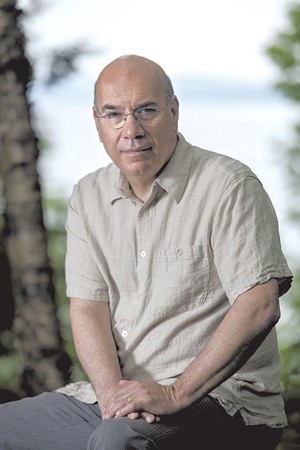
- Courtesy of Bill Eichner
- Julia Alvarez
Last Saturday, author Julia Alvarez stood at the head of a column of folding tables shaded by a small collapsible tent outside Weybridge Elementary School. Some 15 people joined her from the 165 present at the annual town picnic. "It's always a small crowd, poetry lovers," she said with a chuckle into the microphone.
The group — which included two sheep farmers, the editor of the town newsletter and the school principal — had convened not only for the picnic but for the first-ever community haiku contest in Weybridge, population 833.
Alvarez, 68, a celebrated novelist and poet known for her 1991 book How the García Girls Lost Their Accents, has lived in Weybridge for almost three decades. President Barack Obama awarded her the National Medal of Arts in 2015.

- File: Oliver Parini
- Jay Parini
She shares with fellow resident and author Jay Parini the slightly humbler distinction of being Weybridge's poet laureate, bestowed in 2017. It was in this capacity that the two conceived the competition. Parini — fittingly, author of the 2008 book Why Poetry Matters — was absent, volunteering at the Peasant Market in neighboring Middlebury.
The competition was an informal affair; an open call had been issued for entries from residents and outsiders alike. But, as Alvarez explained in an email a day before the festivities, the event had a politically tinged ulterior motive. "More than ever, we need these non-polarizing spaces [like the picnic] where we go down deeper than ideology and the issues that might separate us," she wrote. "And the haiku contest is a further participation in building that community."
Noting that writing and sharing poetry fulfill a need in the human genome to exchange stories, Alvarez quoted civil rights activist Vincent Harding: "There is something deeply built into us that needs story and song and poetry itself. We cannot become really true human beings without story. I think that this country cannot become its best self until we find ways more effectively of institutionalizing the process of sharing our stories."
The social context and political sentiment behind that quote may have motivated Alvarez and Parini to host the competition, but they went unspoken on the day of the picnic.
Attendees filed under a skinny tent that shielded bowls of potato and quinoa salads from a warm sun, along with cookies and Doritos. The smell of good sausage wafted from a grill.
After Alvarez introduced me to a number of residents — including principal Christina Johnston, Sen. Chris Bray (D-Addison) and town newsletter editor Gwen Nagy-Benson — we settled down in the smaller of two lunch tents.
Nearby, local band Snake Mountain Bluegrass performed. Resident sheep farmer Tom Duclos lounged in a chair beside mine, wearing a mustard-colored shirt emblazoned with the band's logo. He nodded approvingly toward the musicians, then told me about two other bands in town, the Horse Traders and the Hay Burners.
When I asked if he had submitted a haiku, Duclos laughed and said no. But I imagined he'd make a good poet, given his humor and perspective on Weybridge's shifting landscape. He literally changed the terrain a few years ago, when he hauled Alvarez's barn across a field to his house. Duclos had a line on the future, too: Relaying that a piece of land where he once pastured his sheep had just sold, he predicted a few new houses would soon appear.
After most of the participants had finished eating, the band made way for Alvarez to take the mic. She used it to summon more bodies from the neighboring tent before launching into her program.
"I think haikus are the most misunderstood poetry form," she began. Although children are frequently taught haiku in school, she noted, the form is difficult to get right. "[But], of the 69 entries that came in, you'd think that Weybridge had poetry in its blood because there were so many good ones."
Alvarez also explained renga, the parent of haiku in pre-modern Japan. "A renga was always a group like us, gathered together," she said. "And the person of honor would get to do the first poem of 17 syllables, called the haiku — that's the first stanza of the renga.
"Then the next person would compose a haiku that leaps off the shoulders of my haiku," Alvarez continued. "There would be a chain of haiku, and we'd go around," resulting in the collaborative renga.
She quickly launched into the awarding of prizes: gift certificates to the Vermont Book Shop and copies of books by her and Parini. First place in the kids' division (14 and under) went to 10-year-old Jonathan Kehoe. Second and third were awarded to Esra and Narges Anzali, 10 and 13, respectively.
The adult winners were Samuel Prouty, George Bellerose and Melissa Lourie. The artistic director of Middlebury Actors Workshop, Lourie was the only one of the three in attendance.
Each winner present read his or her submission, and then Alvarez recited a handful of entries together — a renga of sorts. Common themes were Weybridge's Monument Farms Dairy, friendly neighbors and a beautiful natural landscape.
"I never thought I was much of a poet," Lourie said later, as volunteers scrambled to fold chairs and tables. "I heard about it in the town newsletter, and it just sounded fun. And, because it was a contest, it gives you a particular reason to think about doing it."
Esra, daughter of Middlebury College associate professor of religion Ata Anzali and University of Vermont graduate teaching assistant Fahimeh Bahrami, paused in eating a shaved ice to comment, "I wrote a bunch of [haikus], but I only submitted this one because I thought it was the best."
Noting that she was familiar with the form from school, Esra said her sister's love of poetry inspired her. She added that her favorite way to read poetry is "with all the artists mixed up" — in an anthology.
As we walked to our cars, Alvarez apologized for introducing me to so many people, wondering if maybe I had wanted to do that for myself. But, she added, you never know who's sitting next to you. Could a Trump supporter be breaking bread with a Muslim? Perhaps, in this mixed agrarian and academic crowd.
"You might have missed someone," Alvarez said. To this champion of her small community, it seemed, that would have been a tragedy on par with never getting past the first stanza of the renga.
Weybridge Haikus:
Cotton drifts lazily
Slowly, lethargically
Speaks of the soft heat
— Megan Sutton
A little bit of
Maple syrup mixt with dirt
Roads & farms
— Narges Anzali
Every time you go outside
You see cheerful faces
Knowing you can trust them
— Esra Anzali
Monument Farms sells
Best chocolate milk in world
Really good, try it
— Jonathan Kehoe
Desperate venture
naked white frog throws himself
across the black road
— Melissa Lourie
Utopian school;
Children all above average
In Lake Weybegon.
— Samuel N. Prouty
Julia and Jay P.
Renowned stanza smiths. Not
bad haikus either.
— George Bellerose
Count syllables when
you can't sleep. Haiku's easier
than tallying sheep.
— George Bellerose
*Correction, July 11, 2018: An earlier version of this story misstated the number of people who attended Weybridge's annual town picnic. That number is estimated to be about 165 people.









Comments
Comments are closed.
From 2014-2020, Seven Days allowed readers to comment on all stories posted on our website. While we've appreciated the suggestions and insights, right now Seven Days is prioritizing our core mission — producing high-quality, responsible local journalism — over moderating online debates between readers.
To criticize, correct or praise our reporting, please send us a letter to the editor or send us a tip. We’ll check it out and report the results.
Online comments may return when we have better tech tools for managing them. Thanks for reading.